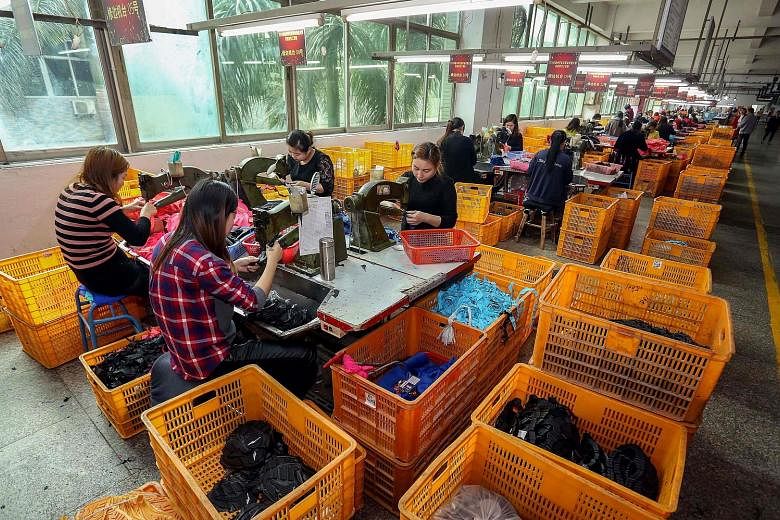WASHINGTON • President Donald Trump was due yesterday to sign two executive orders that will launch reviews of US trade policy, the latest in a series of measured steps that could lead to a revamp of the way the United States engages with the global economy.
The twin orders will initiate a large-scale review of the causes of the US' trade deficits with some of its largest trading partners, and order stricter enforcement of US anti-dumping laws to prevent foreign manufacturers from undercutting US companies by selling goods at an unfair price.
Mr Trump's move will come one week before he meets his Chinese counterpart, Mr Xi Jinping, for the first time, in Florida. China enjoys the largest trade surplus with the US.
Mr Trump put Mr Xi on notice on Thursday when he wrote in a series of Twitter posts that he plans to have "difficult" conversations with his Chinese counterpart about trade issues. He tweeted: "The meeting next week with China will be a very difficult one in that we can no longer have massive trade deficits and job losses. American companies must be prepared to look at other alternatives."
-
Economies in the firing line
-
US President Donald Trump's executive order for a review of the trade deficit will target many territories. Here is a look at five economies the US has a trade deficit with and others in the firing line.
China: US$347 billion (S$485 billion) Japan: US$69 billion Germany: US$65 billion Mexico: US$63 billion Vietnam: US$32 billion
Also up for review: Ireland, Canada, Italy, South Korea, Malaysia, India, Thailand, France, Switzerland, Taiwan, Indonesia
Commerce Secretary Wilbur Ross told reporters on Thursday that the executive action was not meant to single out China or any other country, but he did mention the large gap between what the United States imports from China and what it exports to China, something Mr Trump has railed about for more than a year.
Other economies that he said could be reviewed are Japan, Germany, Ireland, Vietnam, Italy, South Korea, Malaysia, India, Thailand, France, Switzerland, Taiwan, Indonesia and Canada.
America's trade is in surplus. The US Trade Representative lists the 2013 goods trade surplus - the latest on its website - as US$13 billion (S$18 billion), which was up 25.3 per cent from 2012. Singapore was the US' 13th-largest export market in 2013. The balance of trade still favours the US, according to analysts.
Mr Ross said the review "will demonstrate the depth of the administration's intention not to hip-shoot, not to do anything casual, not to do anything abruptly, but to take a very measured and analytical approach both to analysing the problem and, therefore, to developing the solutions for it."
The review would also examine World Trade Organisation (WTO) rules that, according to Mr Ross, did not treat countries equally, such as on taxation. The US has long complained that WTO rules allow exports to be exempt from value- added taxes, but do not allow export exemptions from US corporate income tax.
Mr Ross said the review would also examine the effects of trade deals that have failed to produced forecast benefits.
The timeframe for the completion of the review - 90 days - coincides with the expected start of negotiations to revamp the US-Canada-Mexico North American Free Trade Agreement. Canada and Mexico are among the top five countries with the largest trade surpluses with the US. Japan and Germany round off the list.
In Beijing, officials yesterday sought to downplay trade tensions with the US ahead of the leaders' summit.
Chinese Vice-Foreign Minister Zheng Zeguang acknowledged the trade imbalance, but said it was mostly due to differences in their two economic structures and noted that China had a trade deficit in services. "China does not deliberately seek a trade surplus. We also have no intention of carrying out competitive currency devaluation to stimulate exports. This is not our policy," Mr Zheng said.
Chinese Foreign Ministry spokesman Lu Kang, at a regular news briefing, reiterated a desire for cooperation on trade.
"With regard to the problems existing between China and the United States in trade relations, both sides should, in a mutually respectful and mutually beneficial way, find appropriate resolutions, and ensure the stable development of Sino-US trade relations."
WASHINGTON POST, REUTERS

